- Home
- Andrew McGahan
The War of the Four Isles Page 17
The War of the Four Isles Read online
Page 17
For they were now on the other side of the world, and in enemy waters. And yet so forsaken was this part of the sea, down in the sultry wastes between the Banks and the Barrier Doldrums – all but unreachable save by crossing the Outer Ocean as the Snout had just done – that few Ship Kings patrols ever came here.
Nevertheless, nerves on board had grown taut in the last week or so of the crossing. For all its perils, there had been a certain freedom in roaming the heart of the Wilderness. Now that freedom was gone; they were returning to the war and venturing where they should not go, like thieves stealing brazenly into a rich man’s home. They ceased to burn open lights by night, doubled the lookouts by day, and watched the horizons uneasily.
There were also other, more obscure tensions abroad across the ship – or so it seemed to Dow. No major incidents had interrupted the second half of the voyage, other than the everyday trials of wind and wave, and yet the mood among the officers and crew seemed to have slowly turned sour the closer their objective came.
The pity of it was they had set out in such a spirit of pride and unity, after the attack of the great serpent; they had survived the monster and were pushing on, resolute! Wherever Dow looked about the ship, he had noted a determined cheerfulness in the crew – singing boldly as they heaved on lines on the main deck; laughing and shouting to each other aloft. On the surface all seemed well.
But underneath . . .
Cassandra sounded the first warning. As she had promised Dow, she began to make subtle investigations into Agatha Harp and Jake Tooth. Dow himself had begun to doubt his doubts about the pair – but Cassandra’s reports were disturbing. It appeared that the harpooner and the first officer were spending an unusual amount of time below decks with the crew, acting in friendly fashion, but quietly – so Cassandra had learned – expressing concerns about the captain’s fitness for command, ostensibly because of his drinking, which had indeed been getting worse as the voyage advanced. They spoke no open words of disloyalty, but still, it was ominous.
And as the weeks passed, plainer evidence of undercurrents began to emerge. The laughter and singing among the crew grew less frequent, then ceased. A stony silence became the norm on the main deck, and sailors working there took to arranging themselves into distinct groups, as if suspicious of each other, and would lower their gazes furtively whenever certain officers walked by.
Among the officers themselves, too, concord was slowly dissolving. The meals in the Great Cabin became less and less well attended. First the captain stopped appearing, then Agatha Harp, then Jake Tooth. Soon, everyone was eating alone at random hours. Against all protocol, the weekly command conferences were abandoned, and none of the usual drills were ordered for the crew. Oh, Dow knew that such malaises and paranoias could affect the vessel when too long at sea. Boredom was usually the cause. But he didn’t think this was only boredom.
He was also worried about Cassandra. She veered violently now in temper. At times she was her old self, and happy in his company, but at other times, even as they talked, her expression would grow distracted, as if she was listening to some other voice, and she would withdraw, brooding, or suddenly snap at him – once declaring ‘it was all his fault’, before storming off, never to explain.
But for all that, Dow’s greatest preoccupation in those weeks was not Cassandra, nor the deteriorating atmosphere on board, or anything to do with the Snout at all. More and more, as the miles ran away under the bow, he found himself thinking of what lay ahead of the ship. Banishment – and Nell.
It was startling to consider that he would see her again soon, if all went to plan. Such was not the sole purpose of their voyage, of course – still, every day she drew closer, and a hundred scenes began to play out in Dow’s head, imaginings of what might happen when they finally met; how he would feel, and what he would say – what she would say – after so long apart.
Would she be pleased to see him? Had she thought of him in these last years, when all the while he’d barely thought of her? Did she still believe in their shared fortune, as she had seemed to when they’d parted? Would she approve of what he had done in the meantime? Or would she be disappointed?
And this was assuming she was even still alive! But Dow did not allow himself to think otherwise. She lived, he was sure of it. The thought that tortured him most was that she wouldn’t know – couldn’t possibly know – that he was coming for her. She might be in despair, locked in a cell, cold and hungry and suffering who knew what torments, oblivious to the fact that Dow was close, sailing to her rescue. What if she did something drastic before he could arrive? What if she failed to wait for him by just these last few agonising weeks? Not being able to warn her in some way was terrible . . .
So Dow was vastly relieved when Wayward Reef appeared on the horizon. Yes, it marked their return to the war and to imminent danger, but it meant an end at last to the waiting.
Now there was work to be done!
*
With the ship hove to off the reef, Captain Fletcher summoned the officers to the Great Cabin, the first such meeting in nearly two months.
‘So,’ he said, when they were gathered around the table, ‘here we stand, as unlikely as it seemed that we ever would. We have survived deadly hurricane, poisonous mist and monster of the deep.’ He regarded them all a moment, his eyes red from too many late nights with the rum bottle, if rumour was true; certainly he looked unwell. ‘So much for the easy part.’
There were few smiles, for no one wished to make light of the price they had paid for the crossing; the eleven dead, left far behind in the abyss. Also, the undertones of division remained. Agatha Harp and Jake Tooth sat apart at the opposite end of the table from the captain, and Dow caught many uncomfortable glances cast to and fro by the other officers sitting in between.
‘But now we come to our final folly,’ Fletcher continued. ‘Banishment, and the trifling matter of crossing the Banks to make a landing there.’
‘Actually, Captain,’ said Colonel Oliver crisply – he at least had suffered no lethargy in the latter part of the voyage; he looked as fit and rigid as ever – ‘the ship itself does not need to land at Banishment. Indeed, it would be better if it stayed some distance offshore, out of sight. The assault I have in mind would be made instead with the attack boats. Given that the maximum range of the boats is about eighty miles, the Snout need only get within forty miles of Banishment for the rescue teams to make it there and back again.’
‘Forty miles then,’ said the captain. ‘Well and good. But that still leaves us some four hundred further miles of shallows to cross.’ He turned to Emmet Bone, who was seated at the centre of the table. ‘Pilot, I understand you’ve been studying the matter. Can it be done?’
Emmet Bone shrugged. ‘It won’t be easy.’ He nodded at the table, where various rolled-up charts lay scattered. ‘If I may, Captain?’
‘The meeting is yours.’
The pilot stood, and leaning forward unrolled one of the maps for their inspection. It displayed the southern coast of Great Island, and beneath that the expanse of the Golden Millpond and the arc of the Chain Reefs – Banishment a tiny dot at the chain’s midpoint – and beneath that again, even vaster than the Millpond, the Banks: a great diffuse zone of sand and sediment, marked in perilous yellow, a colour which on nautical charts meant only one thing: Danger, exposed shallows!
‘As you can see,’ said Emmet Bone, ‘the Banks are not charted in any detail. A few channels and sandbanks are shown around the edges, but the rest is blank. All we know for certain is that most of the area is laid bare at low tide, and that even at high tide – and the tides are great here, thirty feet and more – there are still too many shallows to allow a ship like ours to pass. Indeed – at least going by this map – I could never recommend even attempting it.’
‘And yet here you are,’ growled the captain, ‘about to do exactly that. Get on with it, man.’
But the pilot refused to be rushed. ‘First, Captain, I think
it wise that we understand what the Banks actually are. How did they form? And why are the tides so great there, greater than anywhere else in the world? The answer lies in the way water flows about the globe.’
Here – as the captain sighed with impatience – the pilot paused to sort calmly through the other charts on the table until he found a second map, which he then spread wide for all to see. It showed most of the known world, but the Four Isles were drawn as mere outlines, and instead detail was given to the great and perpetual currents that ran, like rivers in the sea, all about the ocean – a phenomenon of much interest, of course, to any ship’s navigator.
‘The wiles of the Great Ocean are never easy to predict,’ Emmet Bone observed. ‘Nevertheless, it has long been understood that three currents dominate the sea, running in three great circles, each stretching from the Ice all the way down to the Doldrums. Gyres, as they are known. Around their rims, water flows with surprising speed and strength.’
The faces about the table were looking somewhat bored; this was elementary navigation. On the map, each current was represented by a stream of arrows indicating its direction and force. One – known as the Central Gyre – revolved in a vast ellipse around the Middle Sea. The other two, the Eastern and Western Gyres, circled one half each of the Outer Ocean.
‘What interests us now,’ the pilot continued, ‘is how these currents interact. Consider: the Western and Eastern Gyres rub together here—’ he tapped a spot on the map, ‘—in the middle of the Outer Ocean. As one gyre flows clockwise and the other counter-clockwise, both currents are in fact flowing south at this same point, and so reinforce one another. Hence, as you’ll recall from our own experience, any ship becalmed in the middle of the Wilderness will be forced south to the Doldrums.
‘But that’s by the by. What really matters is where the Eastern and Central gyres meet; and that point is none other than the waters south of the Kingdoms – in other words, the Banks. But in this instance the two gyres are flowing in opposite directions, one to the north, one to the south. And it is this opposition that accounts for the Banks themselves, and for their remarkable tides.
‘First, the great currents scour up sand from the deeper sea and deposit it in vast quantities against the Chain Reefs. Then the same currents proceed to battle across those sandbanks, one current dominating and then the other, as the gyres ebb and flow. The forces involved are immense, with the weight of entire oceans behind them, piling up water this way and that. In result, a bank can be covered thirty feet deep in one moment, and yet be bare but a few hours later; and there is no pattern to it, no rhyme or rhythm. It’s little wonder the Ship Kings consider the area impassable, and post no guard there.’
‘Again,’ complained the captain, ‘you only tell us that it that is impossible to do what we have come here to do. I wonder why you bother.’
‘I bother, Captain,’ smiled Emmet Bone, ‘because of this.’ Here he withdrew a scroll from inside of his shirt and held it up. ‘It was given to me before we left Black Sands, by the War Master himself, another document from his personal archive, looted from the mansion of the Ship Kings governor, where it was kept under lock and key, for I do not think it was meant to be seen even by many Ship Kings, let alone by us. In short, it is a map – a proper map – of the Banks.’
Now he had the table’s attention. He unrolled the scroll and lay it flat. It was a small chart, and cramped, but it was as he claimed; drawn there were the Millpond and the Chain Reefs, looking much as ever, but below them, instead of the usual featureless mass meant to depict the Banks, was a detailed complexity of green-water channels winding amid brightly marked shallows.
Emmet Bone gave them all a moment to study it in their wonder, then said, ‘It is, I believe, quite an ancient chart, of the same vintage perhaps as the map of the Wilderness; both hail from a day when the Ship Kings were more concerned with exploration than with dominion. In any case, at some point they must have dared the Banks in boats small enough to clear the shallows.
Captain Fletcher’s gaze was roaming sceptically over the map. ‘Aye, but I don’t see that they found any route through the shallows, only a thousand dead ends. And if this map is as old as you say, how can we know if any of these channels even remain as they were then? Look,’ he said, tapping a written notation on the chart’s margin, ‘the mapmakers themselves warn that many of the features they have drawn are shifting and uncertain.’
‘True,’ said the pilot. ‘Which is why the Ship Kings, even possessing this map, still regard the Banks as impassable for any practical purposes. But we are ordered to pass nonetheless, and there may be a way. Look here, at these larger pools.’
He was indicating a series of wide depressions marked amid the sand and the channels; each was maybe ten or twenty miles across, and they ran in a rough line through the heart of the Banks, north to south, dotted about fifty miles apart.
‘See what the mapmaker has written: Here be deep and lasting anchorages. In other words, these are permanent lakes of deep water. Lakes where a ship like ours could safely ride. Consider it, Captain. If we start from the southern boundary of the Banks, and leapfrog from one lake to the next, then we could make our way steadily north. And behold, from the most northern lake it’s no more than another thirty miles across the shallows to the Chain Reefs and Banishment. Close enough for the boats to reach.’
The captain frowned. ‘Leapfrog from lake to lake, you say! How indeed do you make a ship of several thousand tonnes leap?’
‘What I meant,’ answered the pilot, ‘is that we could set out across the shallows when the tide is high, and then when low tide comes we would rest in the deep water lakes. In such stages, I calculate we could reach Banishment in three days from our starting point – and then retreat the same way in three days more.’
But Fletcher shook his head more firmly now. ‘Look at these contour lines. They chart the sandbanks as rising to twenty feet and more above the low-tide mark, between these lakes of yours. You say high tide is thirty feet? That would leave only ten feet of water over such banks. Have you forgotten the Snout has a thirty-foot draught? We’d need a fifty-foot tide at least.’
The pilot’s eyes lit. ‘Ah, but Captain, what if I could promise you a fifty-foot tide?’
‘What?’
‘I have not forgotten the ship’s draught – but have you forgotten the date that is fast approaching? And have you not seen the moon?’
Captain Fletcher opened his mouth and then shut it again. Then, ‘By all the deeps! It’s but ten days until the first of spring! The equinox is upon us.’
‘And not only that, Captain,’ nodded Emmet Bone, ‘by happy chance this year’s equinox will see the moon rising full on the very same day.’
Swift cogitation showed on the faces around the table, followed by a widening of eyes in appreciation. Only Dow it seemed was left nonplussed – his studies in many matters still lagging behind.
But no, there was one other, for now Colonel Oliver – an army officer, not a sailor – spoke up brusquely. ‘The equinox? The first day of spring? What does that matter? Or the moon?’
The pilot’s explanation was patient. ‘You have heard of king tides, yes? They occur whenever the moon is full or new. So for a start we know that in ten days’ time, with the moon full, the waters will be unusually high on the Banks. A circumstance in our favour.
‘But that’s not all: in ten days it will also be the spring equinox. And it is a lesser-known truth that twice a year, at the spring and autumn equinoxes, tides rise to extreme heights also. I’m told it is because the sun is directly over the equator at these times, and so pulls most effectively at the oceans.
‘In any case, it all adds up to this: for a few days either side of the coming full moon, we will see a very rare thing – king tides rising upon king tides. If normal tides reach up to thirty feet on the Banks, then I have no doubt that a double king tide will reach fifty feet at least, and give us a clear path to Banishment.’
&
nbsp; Dow was nodding in excited approval. Fifty feet! Suddenly it all seemed so simple.
But Captain Fletcher was hunched forward, chin resting on his hands, gazing down at the patterns on the map. ‘Equinox or not, Pilot, it’s still a lot of ifs and maybes. I know I am commanded to reach Banishment, but not at any cost. As captain I am still responsible for the safety of the ship and the crew.’
Dow stared, a quick impatience boiling up in him. What was this? The pilot had shown the way! Surely Fletcher could not still be vacillating.
Colonel Oliver seemed to share Dow’s thoughts. ‘For what else have we come here, Captain, if not to make the attempt? If we fall upon the Banks, so be it. It’s war. I see no point in hesitation now.’
The captain gave the colonel a cool glance. ‘It’s a sailor’s opinion I’m after, not a soldier’s.’ He turned to his first officer. ‘What do you make of it, Agatha? Would you advise hazarding a ship this way?’
It was asked, it seemed to Dow, almost as a plea for support, one sailor to another, against the landsman. But Agatha Harp only met the captain’s gaze as if impervious to all appeal, and said, ‘I agree with the colonel, sir. If we have come this far, go on.’
Fletcher nodded with no apparent emotion; and yet still his gaze roamed. ‘Cassandra, you’ve been very quiet. Are you agreed to this course?’
The laundress glanced up. In fact, Dow had spoken with her before the meeting and at that point she had been talkative and in high spirits; but through the pilot’s long dissertation she had become increasingly still, her lips pursed fretfully as she stared at Emmet Bone’s maps. Now, she would not meet the captain’s eyes, and her reply was reluctant. ‘Sir, I’m no expert on equinoxes.’
Fletcher did not release her. ‘Still, it would help me to know if you remain committed to our purpose. To our purpose in full. Because if you have any doubts, now is the time to say so. It is you and I, after all, who will have to stand and report on this mission, if we are ever lucky enough to return home . . .’

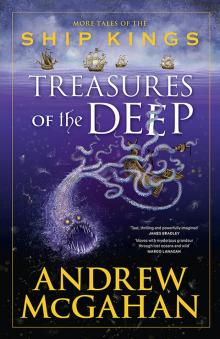 Treasures of the Deep
Treasures of the Deep The Rich Man’s House
The Rich Man’s House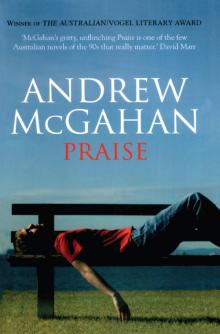 Praise
Praise The White Earth
The White Earth 1988
1988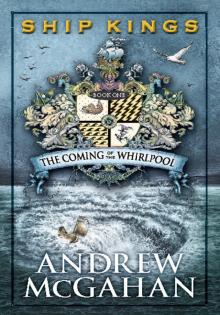 The Coming of the Whirlpool
The Coming of the Whirlpool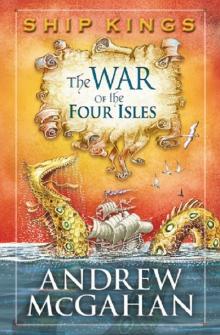 The War of the Four Isles
The War of the Four Isles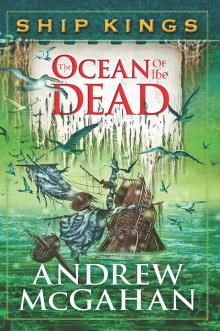 The Ocean of the Dead: Ship Kings 4
The Ocean of the Dead: Ship Kings 4 Last Drinks
Last Drinks Wonders of a Godless World
Wonders of a Godless World Underground
Underground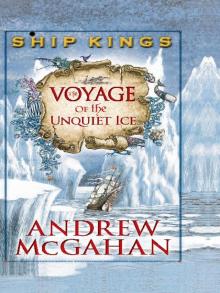 The Voyage of the Unquiet Ice
The Voyage of the Unquiet Ice